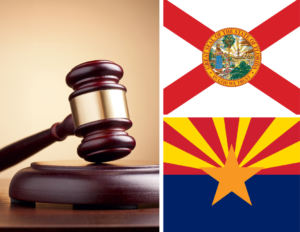
Last week we looked at states with new economic nexus legislation pending after the Wayfair Supreme Court ruling this past summer.
Today we’ll look at companies with pending online sales tax provisions. We’ll be keeping an eye on them in the coming months.
Florida’s Senate Bill 1112 for Online Sales Tax
Quick Florida highlights:
- Passed? Not yet, it’s still in legislation
- Effective date? If it passes, July 1, 2019
- Thresholds? 200 separate transactions or sales exceeding $100,000
- Anything else? Marketplace facilitators need to collect and remit online sales tax on behalf of sellers
Florida’s legislature is considering Senate Bill 1112, which would potentially go into effect July 1, 2019. Under this bill, a company would establish economic nexus in Florida if at least one of these thresholds are met:
- 200 or more separate retail sales of tangible personal property or taxable services
- Any number of retail sales of tangible personal property or taxable services in an amount more than $100,000
Senate Bill 1112 would also mandate that marketplace facilitators need to collect and remit online sales tax on transactions on behalf of third-party sellers. This would apply to those selling to consumers through programs like Fulfillment by Amazon.
Arizona’s Economic Nexus House Bill 2702
Quick Arizona highlights:
- Passed? Not yet, but it has bi-partisan support
- Effective date? The first day of the month following the act’s effective date
- Thresholds? 200 separate transactions or sales exceeding $100,000 for both companies and marketplace facilitators
Despite being one of the states that hasn’t established online sales tax provisions in response to the Wayfair ruling, three years ago Arizona’s Department of Revenue ruled that marketplace facilitators with established nexus needed to collect and remit online sales tax on behalf of its sellers. Although the state already had this in place, it’s now looking to establish an actual economic nexus as well.
Introduced back in February, House Bill 2702 establishes economic nexus by setting the following thresholds for sales made on tangible personal property:
- More than $100,000 from gross proceeds of sales
- 200 or more separate transactions
- A marketplace facilitator with more than $100,000 in gross proceeds
- A marketplace facilitator with 200 or more separate transactions
It’s also worth noting that Arizona doesn’t have a standard sales tax. As Avalara explains, “It imposes a transaction privilege tax (TPT) on businesses for the privilege of doing business in the state. However, the TPT feels like a sales tax because businesses usually pass it on to consumers.”
It’s fascinating to see how states have approached economic nexus provisions following the Wayfair decision last year. As you compare the different states’ legislation, you can see they’re looking at each other’s provisions and using them as the groundwork for their own local economies and communities.
Do you want to know more about online sales tax, economic nexus or any other multi-state tax issues? Contact us today! We’re happy to answer your questions.
Miles Consulting Group, Inc. is a professional service firm in San Jose, California specializing in multi-state tax solutions. Our firm addresses state and local tax issues for our clients, including general state tax consulting, nexus reviews, tax credit and tax incentive maximization, income tax and sales/use tax planning and other special projects. To learn more, contact us today at www.MilesConsultingGroup.com.



















